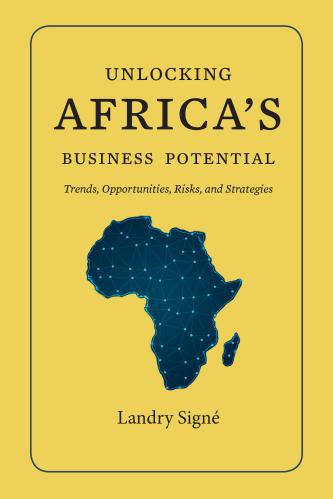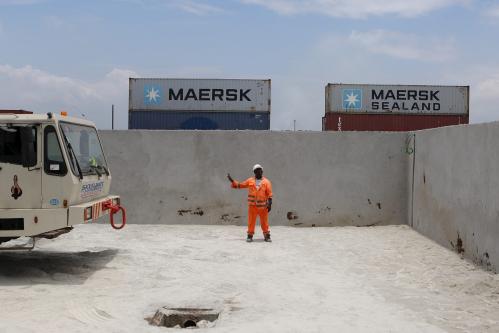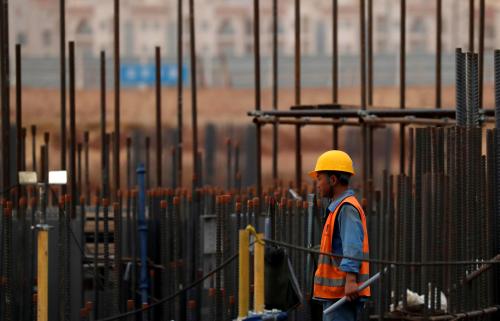Although African economies have slowed under the COVID-19 pandemic and decreases in oil and commodity prices, the authors of a recent publication by the Boston Consulting Group remain optimistic about Africa’s economic prospects and, specifically, the future of its mergers and acquisitions (M&A) market—a small yet important channel for investment in Africa traditionally rooted in mining, energy, and utilities sectors. Although Africa’s share of the global M&A market is small—according to the report, in 2010, it captured only 2 percent of the $3.1 trillion global M&A market—private equity deal volume within the continent has grown at roughly 6 percent per annum since 2012. By 2016, this growth had led to more than $30 billion in investments managed by over 200 funds dedicated to Africa.
Despite the COVID-19 pandemic’s enormous disruption to the growth trajectory of African economies—and the region’s M&A market—the authors find that some historical trends have accelerated faster than others during the pandemic. By analyzing a decade of M&A performance and market activity data, the authors note five distinctive trends:
- “African acquirers.” African-led acquisitions across the continent are growing.
- “PE presence.” Africa-focused private equity investors are on the rise.
- “Tech emerges.” African technology start-ups are attracting numerous investors.
- “Pan-African platforms.” African regional integration is enabling Pan-African, multinational platforms.
- “State-owned portfolio.” State-owned enterprises are reviving interests privatizing their assets.
The authors note that, despite the broad economic fallout induced by the COVID-19 pandemic, some industries and many of these trends have experienced faster growth relative to their historical trajectory (Figure 1). Among the industries that experienced a comprehensive rise in M&A transactions (“deal activity”) are telecommunications, health care, financial institutions, and consumer goods, which the authors attribute to digitalization and shifting consumer preferences during the pandemic. State-owned portfolio privatization—which, according to the authors, has been a strategic tool to generate government funds via selling state-owned assets—has also experienced an extensive rise in transactions. Conversely, natural resources (mining, oil, and gas), power and infrastructure, and transportation industries have experienced marginal increases in the volume of transactions during the pandemic except in state-owned portfolios. The authors speculate that, as multinational investors seek to reduce their portfolio’s risk by diminishing their exposure to African investments, their growing absence may create an investment vacuum and, consequently, substantial investment opportunities for intra-African investors.
Figure 1. Impact of COVID-19 on historical M&A trends by industry
Source: Boston Consulting Group, “What’s New and Next for M&A in Africa,” 2021.
This recent period of economic turbulence appears to the authors to follow a “decline and recovery pattern” similar to the other recent global economic disruptions. The authors find a relatively consistent decline and recovery pattern for Africa’s M&A market in response to global economic shocks (Figure 2). Overall, they find, while Africa’s M&A market experiences steep declines in deal value during economic shocks, the market has been quite resilient and historically managed to nearly recover to its pre-shock peak within several years. This pattern stops in 2016, however, as the African market has yet to recover the height of its 2006-2015 deal value. This precipitous decline after 2016 , which the authors attribute to macroeconomic instability in Africa, coupled with the COVID-19 downturn, has decimated Africa’s M&A deal value in 2020 to $7 billion—nearly a tenth of the M&A market’s historic peak in 2008 and its lowest level since the dot-com bubble in 2002.
Source: Boston Consulting Group, “What’s New and Next for M&A in Africa,” 2021.
The researchers write that, although lingering macroeconomic instability and the COVID-19 pandemic have inhibited Africa’s M&A market, they expect a gradual recovery within 18 to 24 months and a restoration of Africa’s 2019 total M&A market value within three to five years. Overall, the authors remain optimistic regarding the recovery of global M&A activity and the economic growth potential of the African Continental Free Trade Area to promote economic integration, accelerate economic growth, and attract foreign investment—a potent development for not only revitalizing the continent’s M&A market but also for its economic recovery overall.
For more on investment in Africa, read “Figures of the week: Private investment trends in sub-Saharan Africa,” “Figure of the week: Foreign direct investment in Africa,” “Placing investment at the center of Africa’s development strategy,” and Brookings Senior Fellow Landry Signé’s book “Unlocking Africa’s Business Potential.”











Commentary
Figure of the week: Trends in mergers and acquisitions in Africa
April 7, 2021